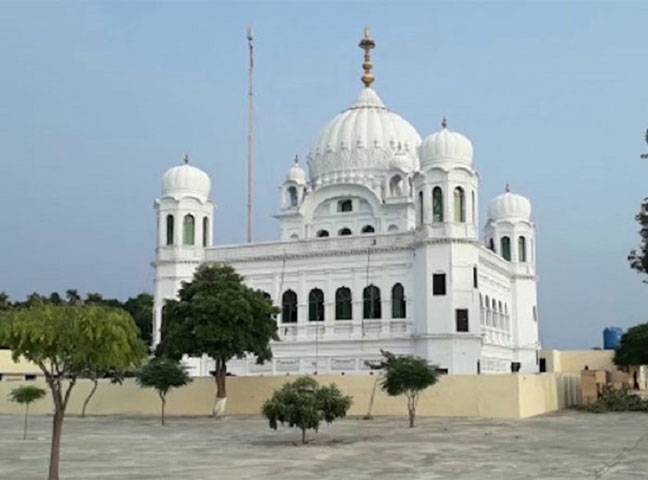ISLAMABAD - Three superpowers, the United States, Russia and China, have backed Pakistan’s decision to build the Kartarpura corridor for visa-free entry to the Indian Sikh yatrees (pilgrims) as the nuclear-armed neighbours eye resumption of dialogue in the near future.
Senior officials at the foreign ministry told The Nation that Washington, Moscow and Beijing believed the step will go a long way in building the trust level between the two arch-rivals.
One official said Pakistan’s peace effort had been acknowledged at the international level. “We have received calls (through the diplomatic channels) from the superpowers and they have supported this decision. They are optimistic this will improve Pakistan-India ties,” he added.
Another official said Pakistan had told the top international capitals that Islamabad wanted resumption of the dialogue process for the sake of peace in the region.
“Our diplomats have urged the superpowers, especially the US and Russia to convince India for the dialogue process. We all agree that only talks will bring results,” the official maintained, citing contacts with the top international capitals.
Last week, Pakistan and India announced they would develop Kartarpura corridor in their respective areas, linking Gurdwara Darbar Sahib in Pakistan with Dera Baba Nanak in Indian Punjab’s Gurdaspur district.
Gurdwara Darbar Sahib, the final resting place of Sikhism founder Guru Nanak Dev, is located across the Ravi River in Pakistan and is about four kilometres from the Dera Baba Nanak shrine in Gurdaspur district of Indian Punjab. The corridor, once built, will give Indian pilgrims easy access to the shrine.
Foreign Minister Shah Mahmood Qureshi had extended an invitation to Indian counterpart Sushma Swaraj, Indian Punjab Chief Minister Amarinder Singh and state minister Navjot Singh Sidhu to attend the ceremony at Kartarpura on November 28.
Swaraj herself declined the invitation but two of her cabinet colleagues will attend the ceremony. India will send union ministers Harsimrat Kaur Badal and Hardeep Singh Puri for the event.
The Indian external affairs minister thanked Qureshi for the invitation but said it would not be possible for her to travel to Kartarpura Sahib due to prior commitments. But the visit of the two ministers to Pakistan is expected to ease tension between the two countries.
“Being mindful of the sentiments of our Sikh citizens and the importance of facilitating their smooth and easy access to holy Gurudwara Kartarpura Sahib, we will be sending Harsimrat Kaur Badal, the Minister for Food Processing and Industries, and Hardeep Singh Puri, the Minister of State for Housing and Urban Affairs, as the Government of India’s representatives for the event planned for November 28,” she said in the letter to Qureshi.
Swaraj also hoped that the Government of Pakistan will expedite the construction of the corridor in order to ensure that “our citizens can pay their respects at the Gurudwara Kartarpura Sahib using the corridor as soon as possible.”
Yesterday, Indian Punjab Chief Minister Amarinder Singh also declined Pakistan’s invitation for the foundation stone-laying ceremony of the Kartarpura corridor, citing the Line of Control tension.
Prime Minister Imran Khan will inaugurate the groundbreaking ceremony of the corridor on the Pakistani side on November 28.
Over the weekend, Prime Minister Narendra Modi hoped the Kartarpura corridor would act as a bridge between the peoples of India and Pakistan. He even referred to the fall of the Berlin Wall to underline the importance of the corridor.
The issue of Kartarpura Sahib came into focus after Indian Punjab Minister Navjot Singh Sidhu visited Pakistan in August to attend the oath-taking ceremony of his cricketer-turned-politician friend Imran Khan as the prime minister of that country.
After his return, Sidhu said that Pakistan Army Chief Qamar Javed Bajwa had told him that the country may open a corridor to Kartarpura Sahib.
The India-Pakistan ties nose-dived in recent years with no bilateral talks taking place. The ties between the two countries had strained after the terror attacks by Pakistan-based groups in 2016.
Foreign Minister Shah Mehmood Qureshi said opening of Kartarpura corridor was a longstanding desire of the Sikh community living in India. He termed endorsement of Indian Prime Minister Narendra Modi and his cabinet on the Kartarpura corridor a ‘great diplomatic triumph’ for Pakistan.
Qureshi reiterated Pakistan wanted to engage India on all forums without being oblivious to the core issue of Kashmir.
Talking to APP on Sunday, Qureshi welcomed India’s decision to send its two ministers to attend the ground-breaking of Kartarpura Corridor, terming it a “positive response to Pakistan’s move”.
“India has responded well to Pakistan’s initiative in its bid to bring the Sikh community closer,” Qureshi told APP during his visit to the stall of Indian High Commission here at the Pakistan Foreign Office Women’s Association (PFOWA) charity bazaar.
Qureshi said with a single yet significant step, Pakistan had won the hearts of millions of Sikhs. He expressed confidence that Kartarpura corridor would attract members of Sikh community to Pakistan from across the globe including from the United States and the United Kingdom.
Earlier, Indian High Commissioner to Pakistan Ajay Bisaria received Foreign Minister Qureshi at the stall.
International relations expert Dr Farooq Hasnat said the decision on the Kartarpura corridor may not impact the overall Pak-India ties. “A pressure was built on Indian government by Sikh community to reciprocate to Pakistan’s gesture. It (positive response) could also be a political tactic of India government as general elections are due next year,” he added.
Pakistan, he said, had also offered visa-free entry to Sikh pilgrims through Kartarpura border. “The Kartarpura corridor will provide smooth and easy passage to pilgrims to visit Gurdwara Darbar Sahib throughout the year,” he mentioned.
Dr Hasnat said Pakistan had fulfilled a commitment with the Sikh community and Islamabad was always willing to resolve the bilateral issues through talks.
Kartarpura decision wins superpowers’ support






